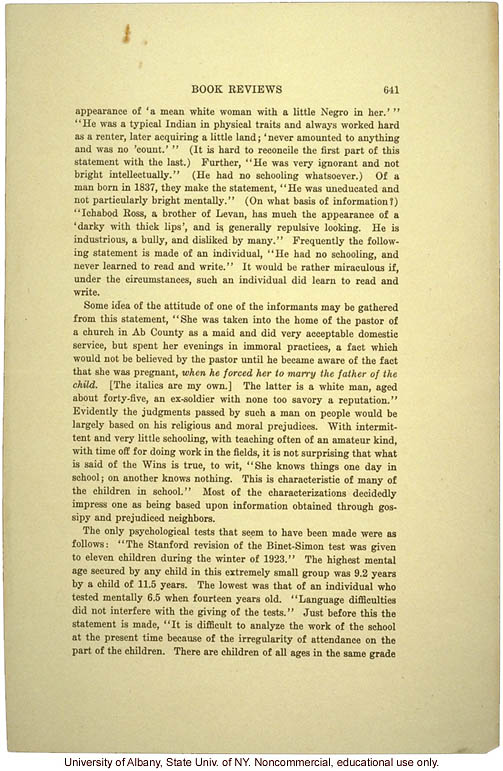ID# 1331: |
Critcal review of Mongrel Virginians, by Abraham Myerson, Mental Hygiene | |||
Date: |
Circa 1926 |
|||
Source: |
University of Albany, SUNY, Estabrook, SPE,XMS 80.9 Bx 1 folder1-36 | |||

 |
|
| |||||||||||||||||

Book Reviews 641 appearance of a 'mean white woman with a little Negro in her.'" "He was a typical Indian in physical traits and always worked hard as a renter, later acquiring a little land; 'never amounted to anything and has no 'count.'" (It is hard to reconcile the first part of this statement with the last.) Further, "He was very ignorant and not bright intellectually." (He had no schooling whatsoever.) Of a man born in 1837, they make the statement, "He was uneducated and not particularly bright mentally." (On what basis of information?) "Ichabod Ross, brother of Levan, has much the appearance of a 'darky with thick lips', and is generally repulsive looking. He is industrious, a bully, and disliked by many." Frequently the following statement is made of an individual, "He had no schooling, and never learned to read and write." It would be rather miraculous if, under the circumstances, such an individual did learn to read and write. Some idea of the attitude of one of the informants may be gathered from this statement, "She was taken into the home of the pastor of a church in Ab county as a maid and did very acceptable domestic service, but spent her evenings in immoral practices, a fact which would not be believed by the pastor until he became aware of the fact that she was pregnant, [begin italics]when he forced her to marry the father of the child.[end italics] (The italics are my own.) The latter is a white man, aged about forty-five, an ex-soldier with none too savory a reputation." Evidently the judgments passed by such a man on people would be largely based on his religious and moral prejudices. With intermittent and very little schooling, with teaching often of an amateur kind, with time off for doing work in the fields, it is not surprising that what is said of the Wins is true, to wit, "She knows things one day in school; on another knows nothing. This is characteristic of many of the children in school." Most of the characterizations decidedly impress one as being based upon information obtained through gossipy and prejudiced neighbors. The only psychological tests that seem to have been made were as follows: "The Stanford revision of the Binet-Simon test was given to eleven children during the winter of 1923." The highest mental age secured by any child in this extremely small group was 9.2 years by a child of 11.5 years. The lowest was that of an individual who tested mentally 6.5 when fourteen years old. "Language difficulties did not interfere with the giving of the tests." Just before this the statement is made, "It is difficult to analyze the work of the school at the present time because of the irregularity of attendance on the part of the children. There are children of all ages in the same grade [end]